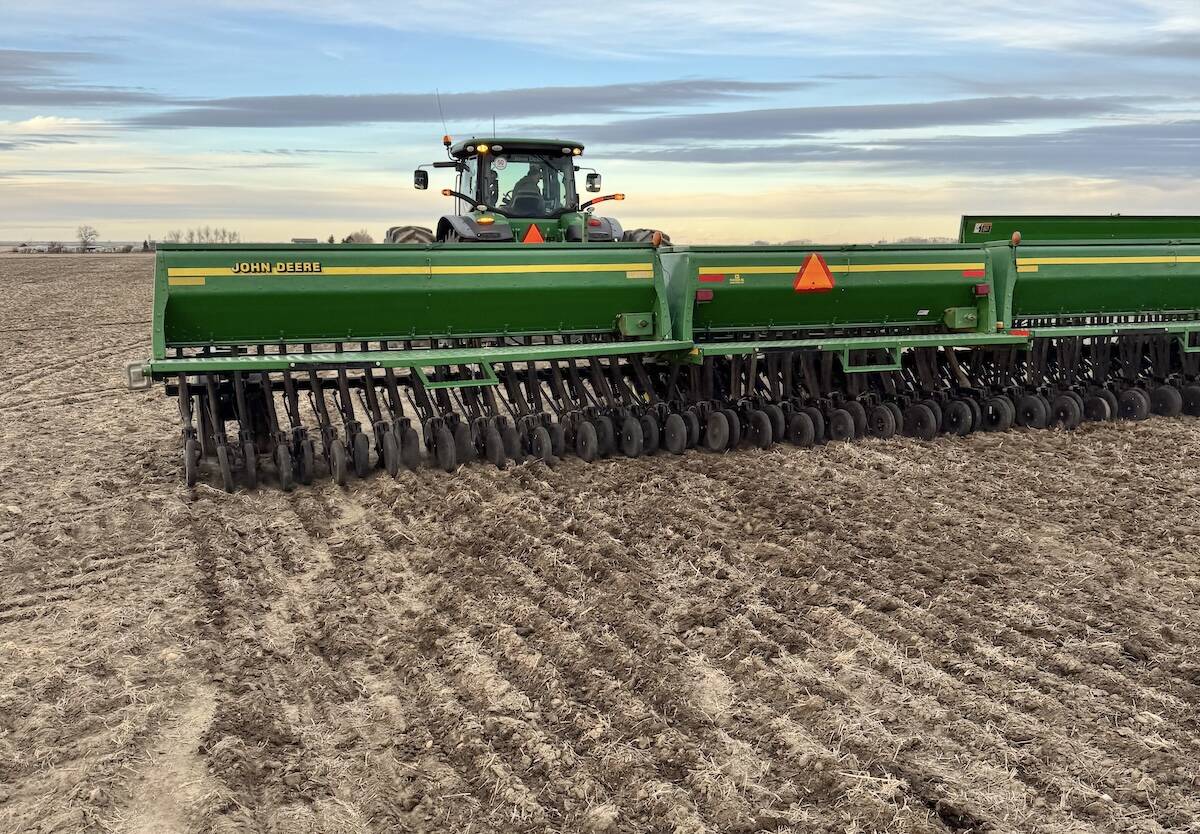With spring around the corner, some farmers are worried they won’t get grain delivered before road bans and field work begins.
Brian Stratuliak is a grain and cattle producer in the Dawson Creek, B.C., area. He had planned to deliver 300 tonnes of feed wheat this winter, but has only been able to deliver 120 tonnes.
“It seemed when the calendar year flipped to 2017 everything slowed down,” Stratuliak wrote via email.
Rail cars are moving, but some farmers are having trouble getting contracts filled, said Rick Kantz, president of the B.C. Grain Producers Association.
Read Also

Southern Alberta farms explore ultra-early seeding
Southern Alberta farmers putting research into practice, pushing ahead traditional seeding times by months for spring wheat and durum
Kantz, who farms near Fort St. John, B.C., said he hasn’t had to deliver grain since the fall, so he hadn’t experienced any trouble first-hand this year. But he’s heard of delays at recent meetings. “Guys are still waiting to fill December/January contracts.”
Kant said he wasn’t sure whether railways were the issue this year.
Dustin Selbach, general manager for Louis Dreyfus in Rycroft, Alberta, said rail performance “has been just excellent this year.” Selbach also manages the Louis Dreyfus elevator in Dawson Creek, and says both his facilities “have been quite fluid.”
The Ag Transport Coalition’s latest report shows that Canadian National (CN) supplied 91 per cent of the cars ordered for Grain Week 31 (the week ending March 4th). CN’s numbers had dipped to 76 per cent in February, the Coalition’s report states. According to the Coalition reports, CN’s order fulfillment has been consistently above 80 per cent for this grain year.
CN’s latest report states that it plans to add the 270 missed cars from Week 31 to the Week 32 spot plan.
Canadian Pacific (CP) has struggled more with order fulfillment, according to the Coalition. In Grain Week 30, the railway supplied 59 per cent of hoppers ordered for that week, although the next week the railway was up to 71 per cent.
CP does take issue with the way the Ag Transport Coalition measures railway performance. Tonnage is a better way to measure grain movement, according to CP, because most of its customers use the Dedicated Train Program. CP’s weekly grain reports show a low of 378,643 tonnes moved in Week 28 (Feb. 5 to 11). Week 31 saw 456,380 tonnes of grain moved.
Problems on the West Coast
Selbach said poor weather on the West Coast has caused issues loading boats this year. “That’s going to slow trains down because they can’t unload there as quick as usual.”
CP has noted poor weather at Vancouver in recent weeks. Rock slides in the mountains and recent storms in Manitoba and Saskatchewan also affected CP’s operations.
CN has reported canola unloading issues at Prince Rupert much of the winter, and right into late February. Delays in the U.S. Pacific Northwest also had a ripple effect in Vancouver in February, according to CN’s weekly report.
Quorum Corporation’s latest report states that there are 36 vessels lined up in Vancouver. The one-year average for Vancouver is 19. Prince Rupert’s queue has hit eight vessels, compared to a one-year average of four.
Plenty of feed wheat to move
The glut of feed wheat this year may also be making it hard for producers to deliver on contracts.
“The Peace Country is inundated with feed wheat,” said Selbach. They can only fill the orders that feed mills can handle, he said, and “most of those feed mills can only handle five, six cars a week.”
Kantz said moving feed wheat is an issue everywhere this year.
“It’s a huge commodity this year,” said Kantz. “They’re going to be a long time working their way through it.”
As for Kantz, he has some contracts with delivery dates coming up this month. “So I guess we’ll be finding out shortly whether they’re filled within the time frame or not.”
Links to grain handling and transportation system reports
- www.agtransportcoalition.com
- www.cn.ca/en/your-industry/grain/western-Canadian-grain
- www.cpr.ca/en/customer-resources/grain
- www.grainmonitor.ca/current_report.html
Farmers, shippers, and others with comments or questions about shipping grain this year can contact Lisa at [email protected].
















